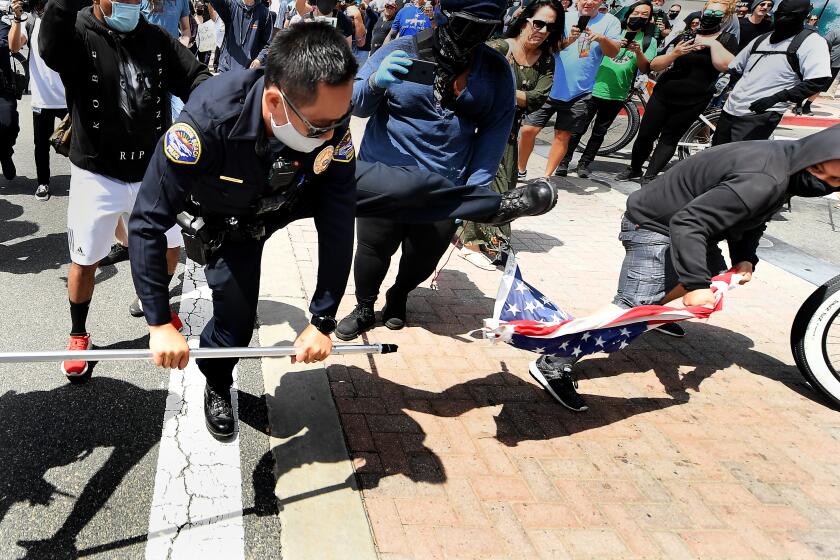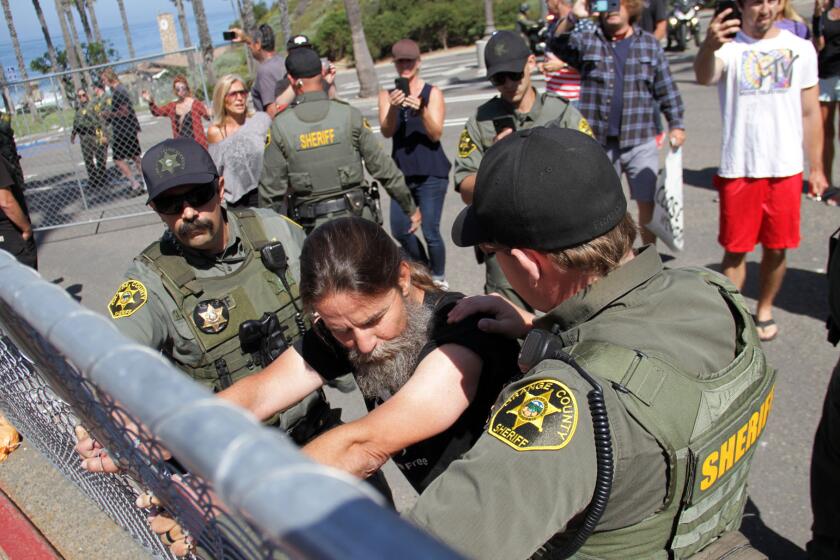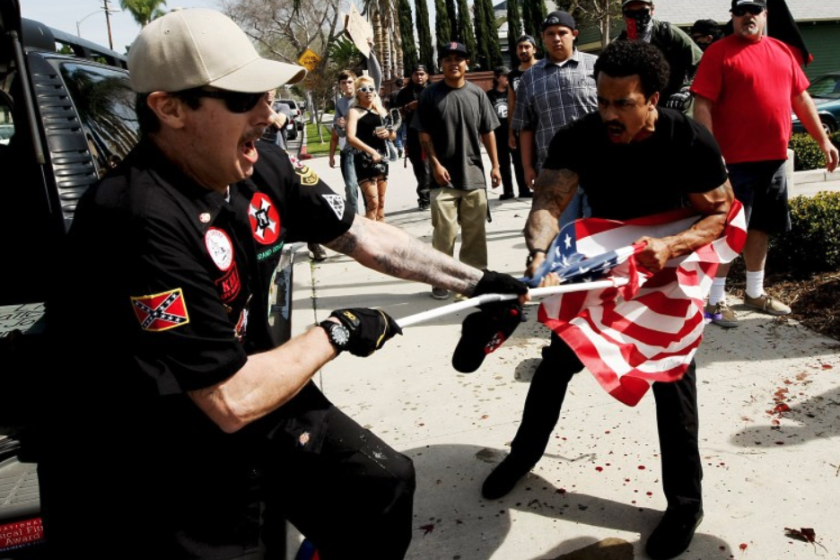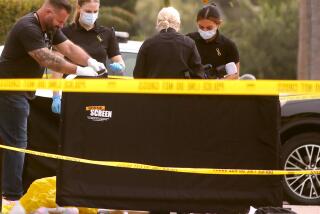White Lives Matter rally ends with large counterprotest, 12 arrests in Huntington Beach
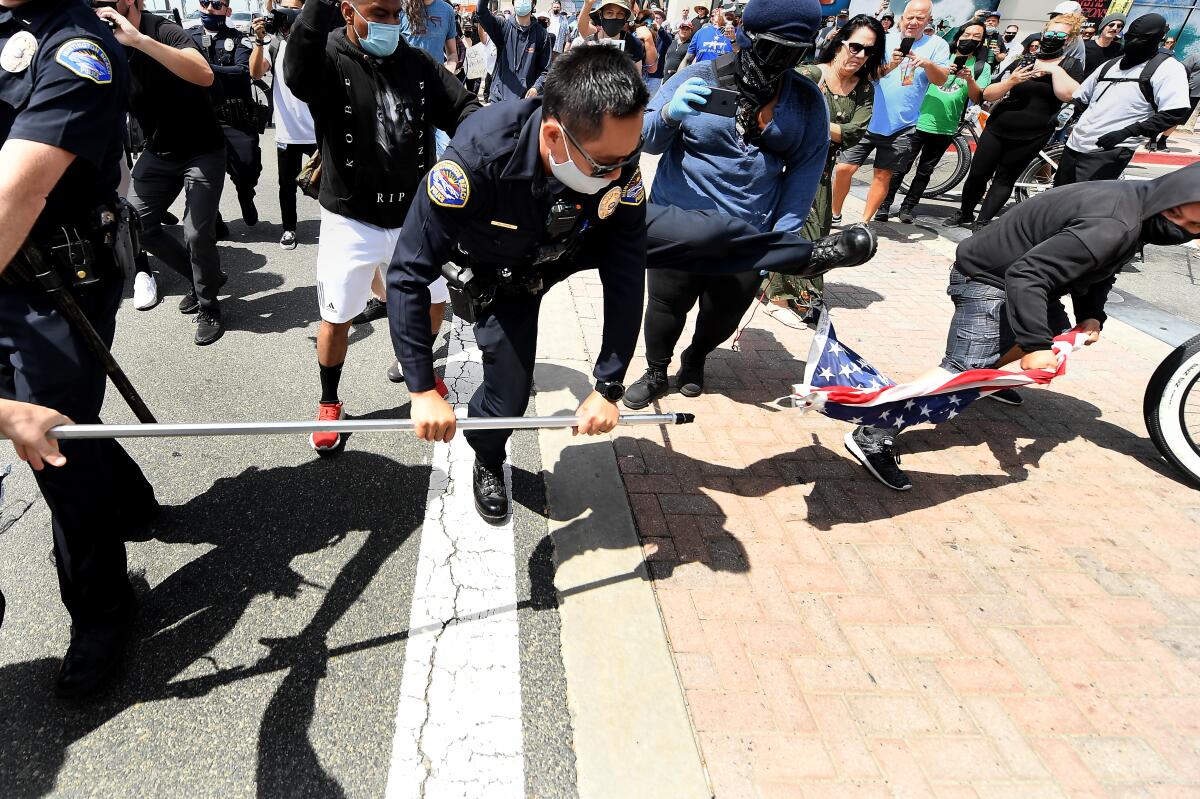
- Share via
A crowd of White Lives Matter protesters and antiracism counterprotesters filled the streets near the Huntington Beach pier on Sunday but quickly dispersed after police declared an unlawful assembly amid increasingly hostile clashes among Donald Trump supporters, those displaying allegiance to white supremacist groups and their opponents.
Several hundred people gathered in the plaza area at the base of the pier Sunday morning to demonstrate against a so-called White Lives Matter rally that was to start at 1 p.m. Police officers stood at the edges of the plaza at Pacific Coast Highway and Main Street as helicopters and drones circled overhead.
But by 2:30 p.m., the crowd had grown to nearly 500 people and police directed everyone to disperse — sending alerts to people’s cellphones in the area threatening arrest — as tensions heated up among rival demonstrators.
The rally drew a cross-section of people with conservative beliefs, including gun supporters and anti-abortion advocates as well as members of the far-right extremist group Proud Boys. William Quigg, who is known as the state leader of the Loyal White Knights faction of the Ku Klux Klan in California, was seen walking through the crowd.
Several hundred people gathered in the plaza area at the base of the Huntington Beach Pier on Sunday to demonstrate against the so-called White Lives Matter rally.
The antiracism protesters vastly outnumbered other groups. Tory Johnson, founder of local grassroots group Black Lives Matter Huntington Beach, said they made it clear that the city wouldn’t be a setting for hate and division.
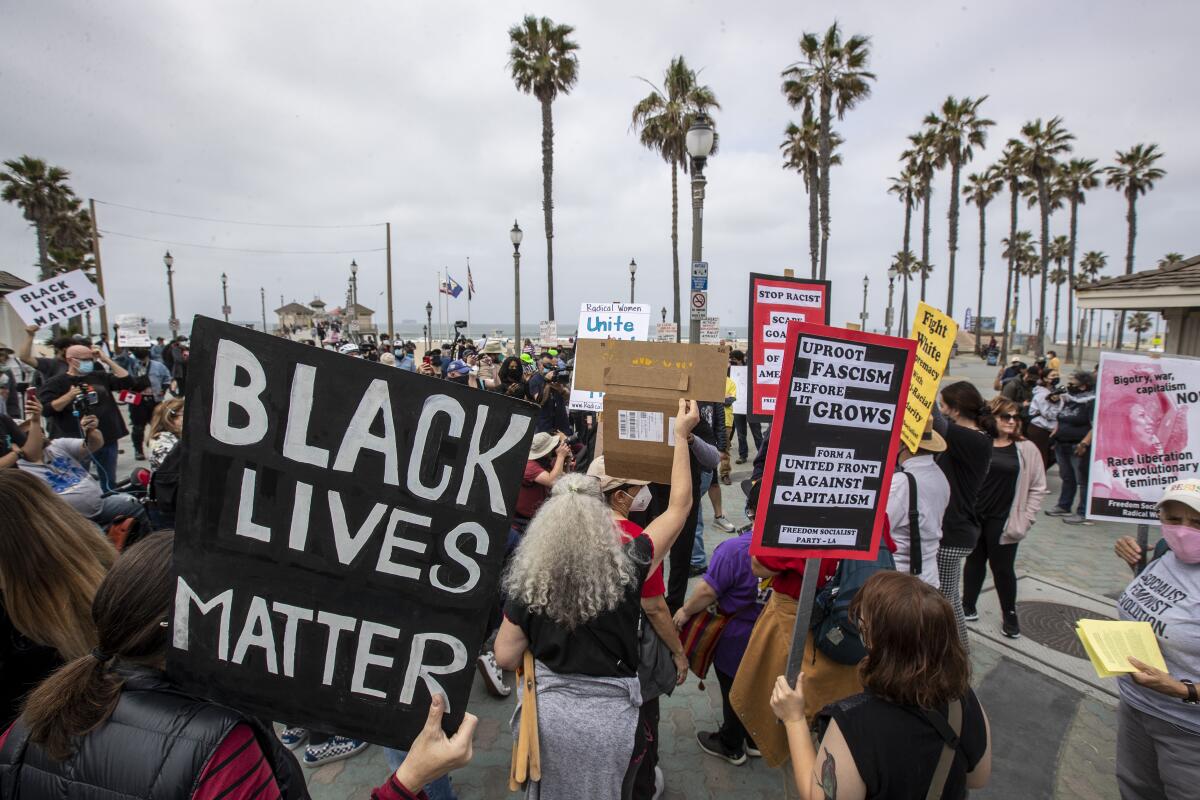
“No Nazis are going to be a reflection of Huntington Beach today,” he said.
The demonstration began peacefully, but as the day went on and the crowd swelled, several confrontations between attendees broke out in the city’s downtown commercial district. Some traded punches, prompting police intervention, while others threw verbal jabs within inches of each others’ faces. Diners eating lunch watched the chaos unfold from a second-floor patio at Fred’s Mexican Cafe and Cantina.
Police arrested 12 people during the rally. Two people were accused of using amplified sound. Police said one person had obstructed law enforcement and that his backpack held a metal baton, two cans of pepper spray and a knife.
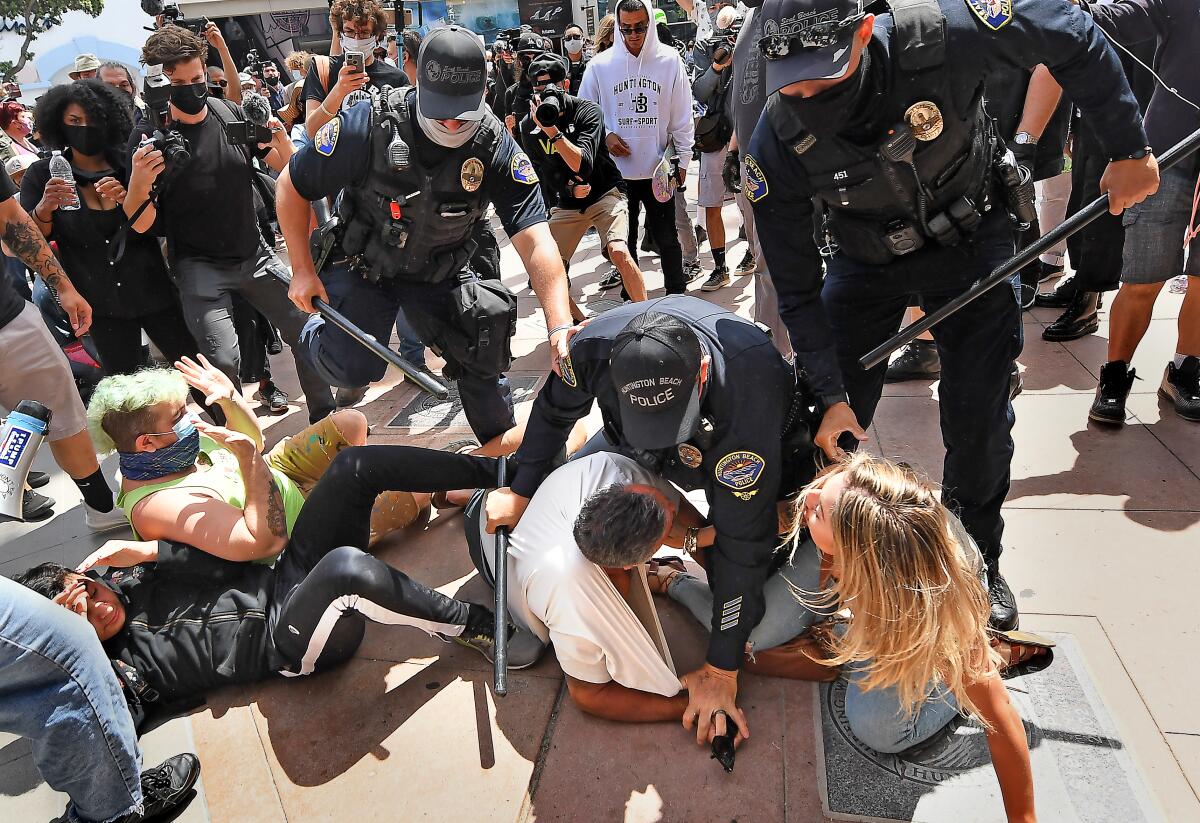
Others were arrested and booked at the city jail on suspicion of public intoxication, fighting or carrying prohibited items at a rally such as pepper spray and long flag poles, Huntington Beach Police Lt. Brian Smith said.
Tensions began to run high shortly after noon when a man with a beard and cigar approached the plaza in front of the pier and said, “White lives matter” several times before yelling at a counterprotester, who held a poster that read “Death to the Klan.”
A crowd quickly converged around the bearded man and chanted, “Nazis go home,” until he retreated across Pacific Coast Highway.
In a separate incident, a man who identified himself as a former Marine was accused of being a white supremacist by several counterprotesters after they saw a skull tattoo on his right arm.
The man cursed at the group and crossed his arms to cover the ink, which he said represented being part of “an elite military unit.” He told the counterprotesters that the tattoo didn’t mean what they thought it meant.
The Anti-Defamation League classifies the image in the tattoo — known as the Totenkopf, or Death Head — as a hate symbol. The image was used by the SS organization and has been adopted by neo-Nazis and white supremacists since World War II, according to the ADL.
Many who arrived at the pier Sunday did so to show opposition to white supremacist activity that’s dogged Huntington Beach for years.
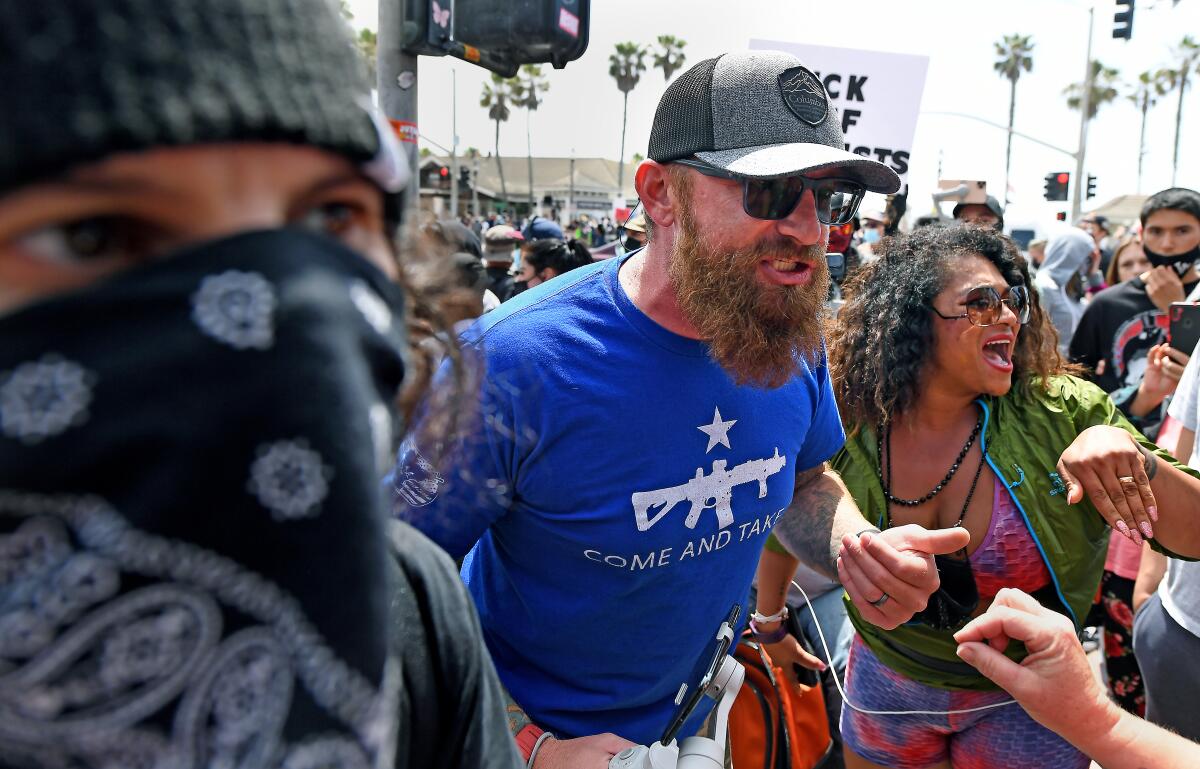
Among them was Denise Wada, a 20-year resident of Huntington Beach, who was horrified when she learned on NextDoor, an app where residents can share information about their neighborhoods, that Ku Klux Klan fliers had been left on the doorsteps of homes in her city. The propaganda fliers also were delivered to homes in Newport Beach and Long Beach in recent weeks. Police do not suspect the same people are responsible for the fliers and the rally.
Wada said there was discussion on her neighborhood forum that maybe it was a hoax but that, regardless of whether it was fake, it demanded a loud response.
“I can’t be quiet about that,” she said. “The point is it’s out there, and racial justice needs a louder noise.”
The White Lives Matter rally, which was advertised via social media, was one of several such demonstrations scheduled across the country Sunday. The rallies were organized through the messaging app Telegram, according to the Anti-Defamation League.
Four members of Orange County’s resurgent far right spoke at a pro-Trump rally in Washington the day before the Capitol riots. Their violent rhetoric targets foes both real and imagined.
Longtime resident Roger Bloom, 65, held a sign in his left hand that read “Old White Guys Against Racism” on one side, and “No H8 in HB” on the other. In his right hand, he held an American flag.
“I’m here to defend my city,” Bloom said. “It’s a great city full of great people. Just because a handful of pathetic losers come out here every so often to a public square and make a stink ... they give this town a bad name. I wish they’d go back to their basements and stay there.”
Antonieta Gimeno, 78, said she drove down from L.A. to show solidarity with the counterprotesters.
“I’m horrified by the violence against Black people, Mexican people, Asian people,” said Gimeno, who is Mexican. “This is a small step, but the more people who stand in unity, the more we can show that in order for white lives to matter, Black lives have to matter too.”
Huntington Beach has been grappling with extremism for decades. In the 1980s and 1990s, its pier and surf spots became a draw for skinheads, white supremacists and neo-Nazis.
The far right in Orange County remains a force and is building on a long history of extremism.
Two high-profile hate crimes in the mid-1990s solidified the city’s reputation as a hotbed of racism. In 1994, two skinheads gunned down a Black man outside a McDonald’s on Beach Boulevard. Vernon Windell Flournoy, 44, stumbled into the restaurant and collapsed in front of horrified diners.
In 1996, Erik R. Anderson, 22, a skinhead and card-carrying member of the Ku Klux Klan, stabbed a 20-year-old Native American, George Mondragon, 27 times at the beach. Anderson was convicted of attempted murder and given a life sentence. Two others served prison sentences for their roles in the attack.
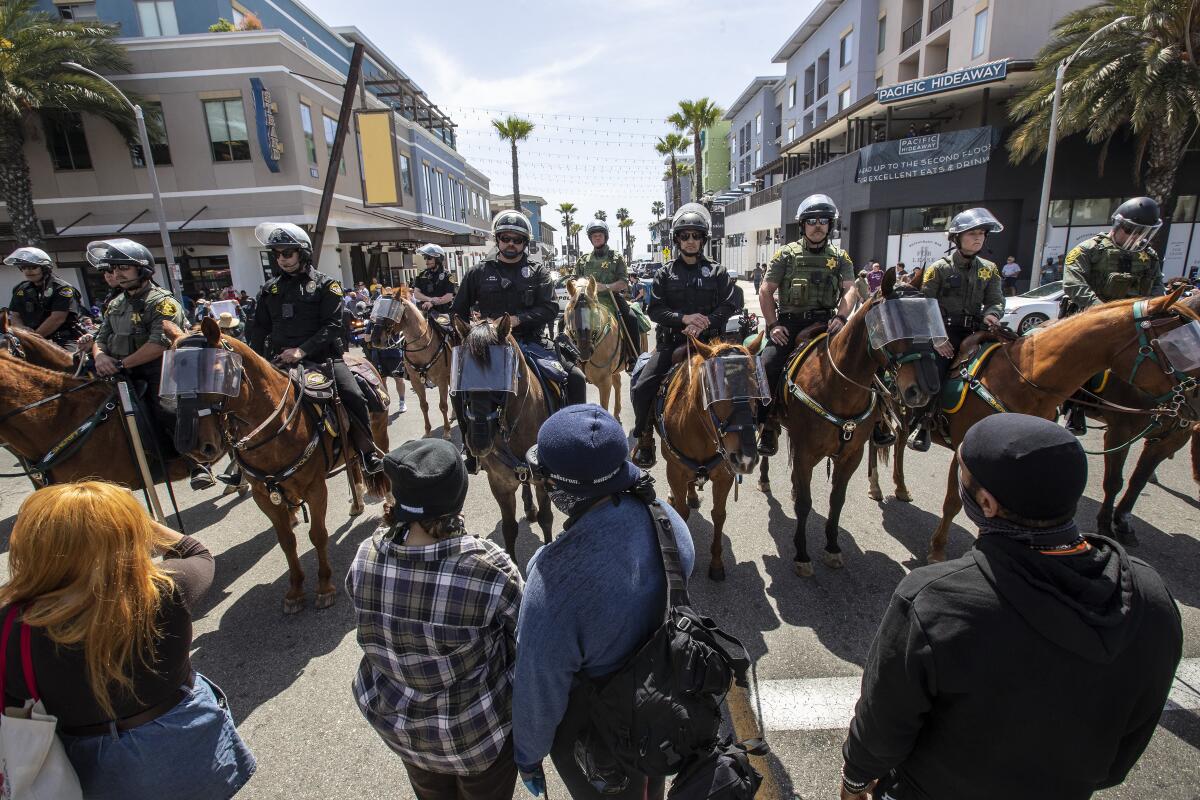
In response, the city stepped up police presence on Main Street and created its Human Relations Task Force. Although skinheads are not frequently seen at the city’s popular gathering spots, some say the racism simply took on a more insidious form.
In 2018, the FBI arrested Huntington Beach resident Robert Rundo, leader of the so-called Rise Above Movement, a far-right street-fighting gang whose members allegedly trained for combat at political demonstrations across the state and in 2017 assaulted counter-demonstrators at the deadly Unite the Right march in Charlottesville, Va.
More recently, Huntington Beach’s downtown and pier have become a rallying spot for anti-mask activists and right-wing Trump supporters. Mixed martial arts fighter Tito Ortiz, a vocal opponent of public health rules who’s been known to share conspiracy theories online, was elected to its City Council in 2020. Running under the campaign slogan “Make Huntington Beach Safe Again,” he received the most votes in a council race in the city’s history.
Though Huntington Beach remains largely conservative, it is increasingly an island surrounded by growing liberalism and racial diversity. Experts say such demographic shifts are the strongest predictors of increases in political extremism and hate crimes in neighborhoods where some fear their way of life is under threat.
“White Lives Matter isn’t a group; it’s a whole subculture,” said Brian Levin, director of the Center for the Study of Hate and Extremism at Cal State San Bernardino. “The swastikas and Klan hoods just aren’t great branding and recruiting tools. Their focus now is the message that whites are under attack.”
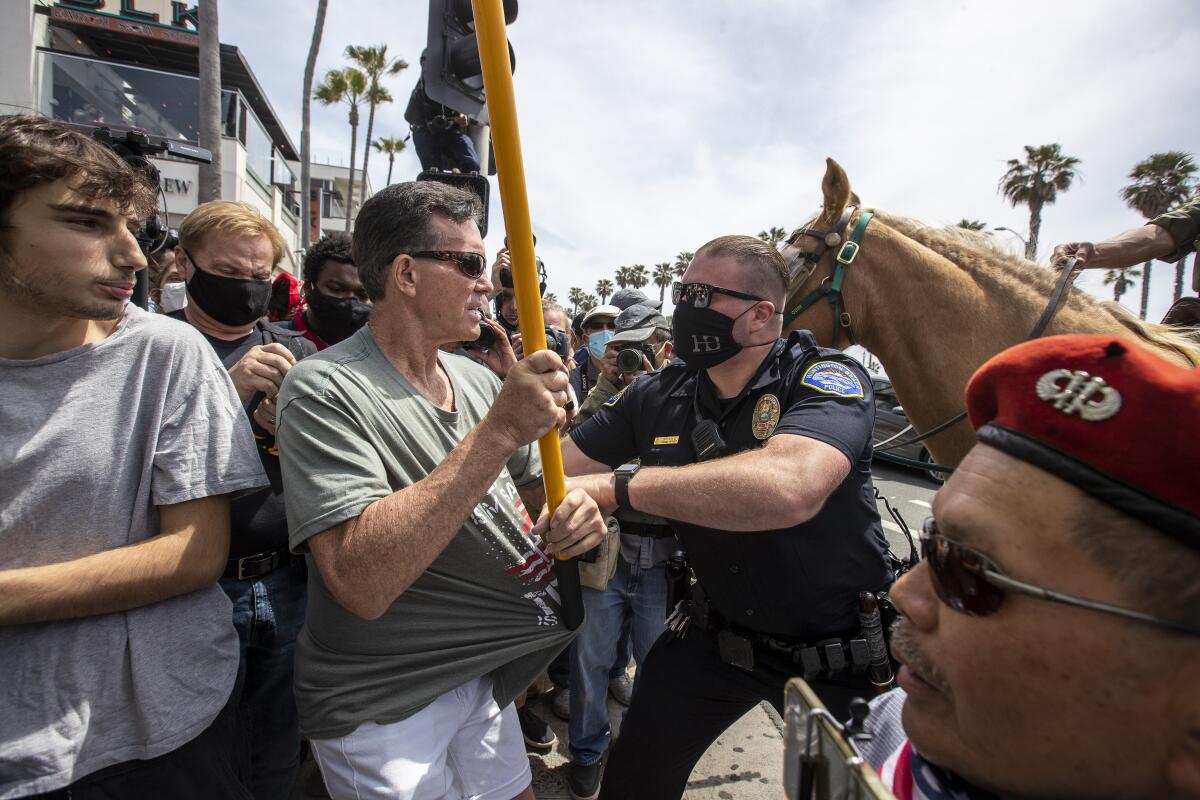
Times staff writer Alex Wigglesworth contributed to this report.
More to Read
Sign up for Essential California
The most important California stories and recommendations in your inbox every morning.
You may occasionally receive promotional content from the Los Angeles Times.
